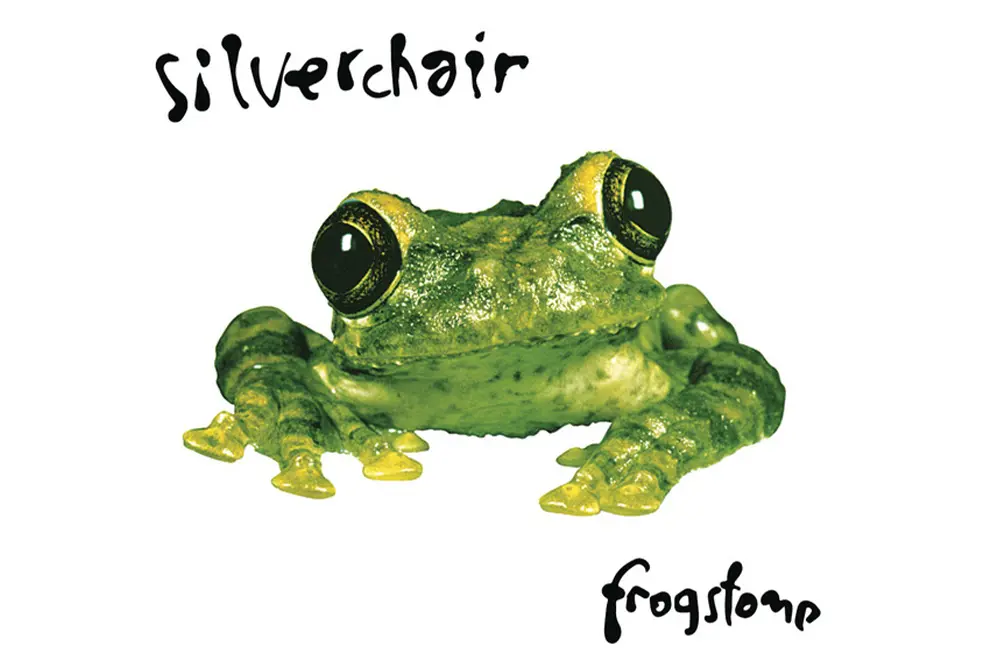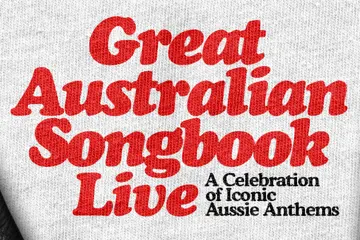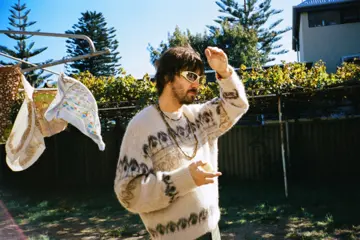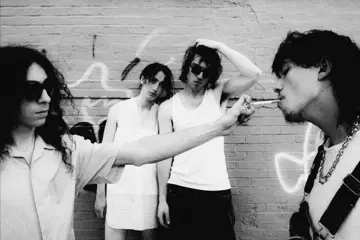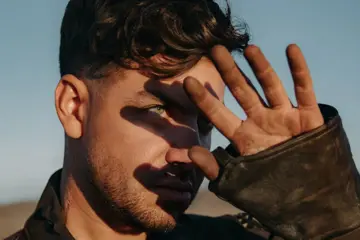 Silverchair
Silverchair30 years ago a trio of mid-teens from Newcastle named Silverchair blasted their way into our lives with their debut album Frogstomp, proving once and for all that age is merely a number and will always be trumped by talent.
BF (BEFORE FROGSTOMP)
The scene: the second Gold Coast Big Day Out festival in January 1995.
A mate and I are watching one of our favourite bands, abrasive Melbourne pub-rockers Cosmic Psychos, at a smaller outdoor side-stage amidst the massive Gold Coast Parklands when we begin to notice a growing anomaly in the surrounding crowd—an obvious and burgeoning abundance of kids.
We were only in our mid-twenties ourselves, so hardly long in the tooth, but we were veterans of both festivals and Psychos gigs, and one thing you usually don’t spy at either is children. Yet all around us are hordes of school-age kids sporting perfect facsimiles of the grunge uniform so commonplace at the time, all obviously excited for something or someone that clearly isn’t the Psychos.
After a few moments of confusion, it dawns on us that next up on this stage are the young Newcastle band Silverchair - who’d been making huge waves with their debut single Tomorrow, which, towards the backend of 1994, had spent six weeks at #1 on the Aussie singles chart - hence this alarming adolescent army which was rapidly outnumbering us ‘oldies’.
Don't miss a beat with our FREE daily newsletter
At the end of the Psychos’ set, we head off to grab a beer, but a little while later, curiosity gets the better of us, and we return to the stage where Silverchair are now strutting their stuff, only to witness a sight of pure, unadulterated mayhem.
The three kids on the small stage - Daniel Johns (guitar/vocals), Ben Gillies (drums) and Chris Joannau (bass), all still 15 years of age - are going for it, leaving nothing in the tank. Before them, the ecstatic waves of youngsters we’d spied gathering earlier were now in their element and being whipped into a frenzy of excitement and jubilation. It’s a sight you’d expect to see at any mid-‘90s festival, except in this instance, nearly all involved are a foot shorter than usual and years away from reaching drinking age.
The trio’s songs are fully formed and muscular and clearly resonating completely with the besotted audience before them - this is literal teen angst being delivered straight to its teenage target market in the musical parlance of the times, and every punch is landing hard.
To many at the time, the grunge era ended almost a year earlier with the tragic passing of Kurt Cobain, but these kids have all been weaned on a steady diet of Nirvana, Pearl Jam, Soundgarden and Helmet and now they can see themselves mirrored in the precociously talented trio in front of them, and the impact is immediate and visceral.
History tells us that this pint-size diorama played out at instalments of the Big Day Out all around Australia that January, with their hometown appearance in Sydney by all accounts a particularly riotous assembly.
Silverchair had found their tribe, and when their debut album Frogstomp dropped a couple of months later - on 27 March 1995, to be precise - it debuted at #1 on the ARIA Australian albums chart.
INCIDENTAL SUCCESS
30 years on from this momentous occasion in Australian music - the rise and rise of Frogstomp - it’s virtually impossible to look back on the album’s success without viewing it through the prism of Silverchair’s youth.
Frogstomp stayed at top spot on the Australian charts for three weeks, as well as cracking the Top 10 in the States (#9) and the Top 50 in the UK (#49), on its way to global sales of over 10 million copies, an incredibly auspicious start for any band regardless of age.
But such audacious success had never been on the agenda and had happened quite organically, as Daniel Johns told triple j’s Richard Kingsmill at the time.
“We’re trying to keep it quiet,” the singer offered. “All we want the album to do is hang around in the alternative charts in the Top 20 for a while, and then it can drop down and do whatever it wants.
“It’s not that we don’t want success. We just don’t want to be established as a mainstream teen band. We want people to take us seriously.”
Drummer Ben Gillies concurred when speaking to the Rewind podcast about Frogstomp’s 25th anniversary.
“We were really passionate about music and excited about it,” he smiled. “It was like we discovered a secret kind of society that only a handful of people around the planet had tapped into, and we were just lucky enough to have discovered it – as in music and playing in bands and playing music with your friends.
“So for us hanging out with your mates and being silly and having fun – I kinda think that’s what played into the band coming together because we just loved music, and the band brought us together. So I think in those early days – and also without having any external influence, there was no record company or managers or anyone saying ‘this is what we think you should do and this is where I think you should go’, there was no kind of advisors telling us anything – we were just teenage boys having a blast and running around doing what we loved.
“There were no preconceptions, and I think for that first album, and for those first few tours, we were just a few ratbags from Newcastle who could play some decent music just running around and enjoying the experience. It wasn’t until later on that there was a lot of external influence coming to the band.”
Though Gillies did admit to an element of ambition in the early days of Silverchair.
“We were pretty excited by the prospect of just trying to do something with it,” he offered. “We definitely had the love and the passion for music, and we were doing it for the right reasons, but we also definitely had that ambition.
“I remember going to Dan’s house quite a few times, and the two of us would sit around and talk about how we’re going to be the biggest band in the world, and I think at 12, 13, 14 years old, we’d talk about how good we were going to be when we were 18 – ‘can you imagine how good we’re gonna be?’”
The band’s formation and rapid rise is now an established part of Aussie rock folklore: picking up instruments in Newcastle bedrooms at the age of 12 and naming themselves The Innocent Criminals, recording a demo at Platinum Sound Studios, their nascent version of Tomorrow winning the Pick Me competition run by SBS show Nomad, and the resulting prize - having that song professionally recorded by JJJ and a film clip shot - culminating in a good old-fashioned record label bidding war won by Sony offshoot Murmur.
There was a fortuitous sense of ‘right place, right time’ at play as well. Just a few years earlier, Nirvana’s Nevermind opus had turned the musical world on its head and sent record labels of all persuasions scurrying into the margins of the underground in search of the next big thing.
It was amidst that frenzy that Sony started the Murmur imprint - named after R.E.M.’s classic 1983 debut album by the label’s co-founders John O’Donnell and John Watson (who would before long jump ship to focus on managing Silvechair) - to tap into the then-thriving ‘alternative’ scene that was popping up around Australia.
When Murmur won the coveted Silverchair signatures - by the end, the running had been whittled down to two labels, Murmur and Michael Gudinski’s Mushroom - it was in part due to the business plan they’d proposed under which the band’s tender years were to remain as far from the focus of the Frogstomp story as possible.
The band’s education would remain a constant priority—tours and recording sessions would take place during school holidays, with tutors taken on the road when this wasn’t possible—and short-term success would be deemed far less important than allowing the band a chance to become rounded adults.
“The Tomorrow single was undeniable from the first time that we heard it,” Watson remembered to Rewind. “Not long afterwards, we saw the video that Robert Hambling had created for the band, which was also part of their prize, and I think that there was something pure about it, something undeniably real and authentic – this was clearly just kids loving the sound it makes when you play guitars.
“At that age when you’re 14 years old – Ben and Chris were 14, and Daniel was 15 – when you’re that age, you’re not making music to be on the cover of Rolling Stone or even to meet girls, you’re doing it because you like how it sounds when you play music together. So, there was a real purity of intent.
“So in our conversations with the band, they were savvy enough to realise that there was the potential for someone to portray them as a novelty act, and they really didn’t want that. And there was also – in our view – the fact that ‘if this is what they’re capable of at 15, imagine what they’ll be able to do at 25 if given the chance’.
“But that plan that John and I then finessed and attached to the offer and which became the document that we tried to execute was very much based on NOT exploiting the age and very much trying to keep it cool and make people see them live, don’t let them be put in positions where they could be seen as a gimmick or a novelty. We wanted to get people to see them play and say, ‘Hey, they’re a really good band and have got really good songs and given time to develop they’re going to turn into something really special’.”
Under this Murmur business plan for Frogstomp, less was more. Despite the mainstream press becoming infatuated with the band’s youthful success, they refused all offers for TV interviews - even knocking back big players like 60 Minutes numerous times - as well as avoiding interviews with pop and teen outlets such as Smash Hits and Dolly.
There was even a recent Australian precedent for what could go wrong for a band once engulfed by the fickle nature of teenage infatuation, one which had played out just a couple of years earlier.
“A lot of what we were doing in the first instance was trying to ensure that Silverchair didn’t become Ratcat,” Watson continues. “Ratcat had been this really cool inner-city band who by no fault of their own just wrote some really catchy songs and found themselves playing to the pop audience that they felt no affinity with, and as a consequence, all the other sides of the tracks abandoned them, and then the pop audience moved on to something else so they kind of lost their career.
“We thought that it’s one thing to be washed-up at 30, imagine being washed-up at 16.”
THE POST-FROGSTOMP VISTA
This plan to save Silverchair from their own circumstances was, for the most part, a massive success.
Most teenage bands barely escape the bedroom or garage, let alone tour around America, opening for Red Hot Chili Peppers and the Ramones or playing on the awning of NYC’s famous Radio City Music Hall to open the MTV Music Awards.
The band’s age was a fact that couldn’t be changed so was still a huge part of the conversation around the band in the Frogstomp era - a lot of the blowback the band received centred around their youth, with monikers such as Nirvana In Pyjamas and Sound-kindergarten being thrown around liberally - but they succeeded in not letting this override the band’s abundant musical talents, which were nurtured and allowed to shine over time.
Silverchair went on to become one of the most successful - and beloved - rock bands in Australian history, with all five of their albums debuting at #1 on the Australian albums chart. They had three #1 singles in their homeland, and would win a record 21 ARIAs from 49 nominations (including five from nine for Frogstomp).
Silverchair’s success even opened the door for a lot of other Australian bands in that hardest of markets, America.
“The thing about Silverchair knocking down the door internationally, there’s no doubt that off the back of Frogstomp, a lot of Australian artists got given international opportunities that they might not otherwise have gotten,” Watson reflects. “Australia became the flavour of the month again – which happens about every five years, by the way, in the history of Australian music.
“After INXS in 1986, there was one of those as well after Kick, a lot of bands got deals, and then it all goes away, and then Silverchair comes along a few years later, and they get a big run, and suddenly The Living End and Powderfinger have doors opened for them, You Am I signing to Warners and Magic Dirt got signed as well – a number of artists who got a shot at least partially because Silverchair had their success and people thought, ‘Oh bands from the other side of the world can make it here’. That was great.”
It’s hard to maintain that presence in the States over a whole career though without actually pulling up stumps and basing yourselves in America, so - despite an enduring fanbase there - Silverchair would never again replicate the success of Frogstomp on foreign shores.
“Frogstomp was in many ways the band’s greatest asset and its greatest liability,” Watson offers. “It was an asset in the sense that it made them a household name, and it was a liability in the sense that it then created this perception of them as ‘teen grunge sensations from Down Under’, and they then had to spend the rest of their career trying to broaden that and shake that off.
“I think most people find it hard to understand why they’d want to shake it off – it’s a great record, it was really successful, a lot of people love it – the problem is that when people say that, I say to them, ‘How do you feel when you look at photos of yourself when you were 15? Your mum will tell you you were really good-looking and you’re a beautiful person, but does it make you cringe?’ And it usually does.”
For Gillies, the fleeting nature of his band’s overseas fame caused by Frogstomp isn’t important, and he prefers to focus on the friendship, camaraderie and the music he made with his mates.
“I still reckon Frogstomp is probably our most honest record,” he says. “All of the songs were written before any fame or any success, and all the recordings were done before the band took off, so I think it’s really hard to replicate.
“Like anything in life, once you do it for the first time, it’s done – you can’t do anything for the first time again – so for me, it’s the one that’s the least untouched by external forces and having other hands involved. For that reason, I think it’s the most honest album, and there’s no other preconceptions of what we had to do or whether it had to be successful. I think it’s probably why it’s an album that’s really stuck with people and stood the test of time.
“I’ve always been pretty fond of the record. Obviously, we grew a lot as musicians and writers, but capturing that magic of something that’s completely unrefined and it’s just pure instinct and pure gut and doing something because you love it with every part of your soul, because it captured that moment before any external influence I think that’s one of the reasons that makes it so special.
“That’s kinda what I hold onto, and when I have heard bits of the record since – particularly as you get a little bit older – that’s what I hear in it, that kind of raw excitement and just that something really unrefined about it that’s really hard to capture. So I love it, and I’m really thankful as well.”
With Frogstomp, Silverchair survived and thrived through circumstances that would have derailed most bands, courtesy of a heady mixture of good luck and great management, and we were all the beneficiaries.
When Rolling Stone Australia published their list of The 200 Greatest Australian Albums Of All Time in 2021, Frogstomp was ranked #6, with Tyler Jenke writing of the achievement:
“It feels cheap to write Frogstomp off as an album full of teenage angst and fury, but even at such a young age, Silverchair were managing to encapsulate the feelings many of us would hold for years to come. Even now, new Aussie bands of all ages still look towards Frogstomp for guidance in how to write a good rock song.
“As time would march on though, Silverchair too would find themselves evolving past this early grunge sound and expanding their sonic palettes with almost universal acclaim at every turn. But in those early days though, Silverchair served as outliers in the world of Australian music. No longer was age and experience a prerequisite. As long as you could write a decent song, people would listen. And people did listen. In fact, the whole world did”.
You can celebrate the 30th anniversary of ‘Frogstomp’ by listening to the album here.

